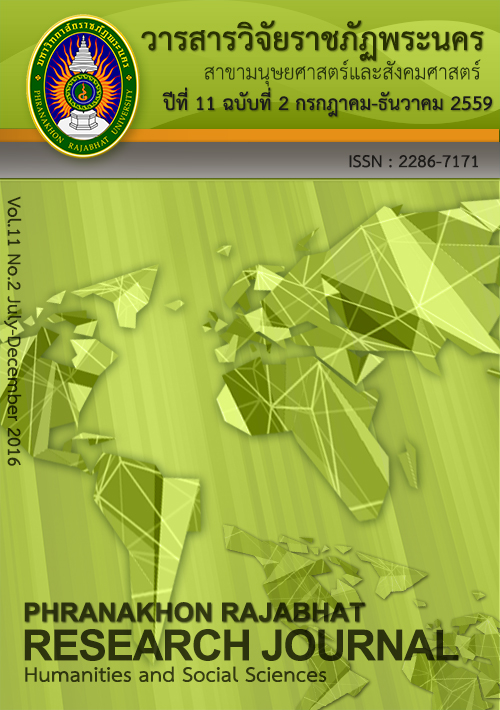การบริหารจัดการป่าชุมชนขององค์การบริหารส่วนตำบลในจังหวัดฉะเชิงเทราตามแนวคิดการบริหารจัดการที่ยั่งยืน
Main Article Content
Abstract
การศึกษาครั้งนี้มีวัตถุประสงค์สำคัญเพื่อ (1) ศึกษาปัญหาเกี่ยวกับการบริหารจัดการป่าชุมชน
(2) ศึกษาแนวทางการพัฒนาการบริหารจัดการป่าชุมชน และ (3) เสนอตัวแบบการบริหารจัดการป่า
ชุมชนขององค์การบริหารส่วนตำบลในจังหวัดฉะเชิงเทราตามแนวคิดการบริหารจัดการที่ยั่งยืน โดยใช้
รูปแบบการวิจัยแบบผสมผสานซึ่งเน้นการวิจัยเชิงปริมาณเป็นหลักและใช้การวิจัยเชิงคุณภาพเป็นข้อมูล
เสริม การวิจัยเชิงปริมาณใช้แบบสอบถามเป็นเครื่องมือในการเก็บรวบรวมข้อมูล แบบสอบถามได้ผ่าน
การทดสอบเพื่อหาค่าความเที่ยงตรง ได้ค่าเท่ากับ 0.90 และผ่านการหาค่าความเชื่อถือได้ที่ระดับ 0.87
กลุ่มตัวอย่าง คือ ประชาชนในเขตพื้นที่องค์การบริหารส่วนตำบล 9 แห่ง จำนวน 1,099 คนซึ่งได้จากการ
คำนวณขนาดของกลุ่มตัวอย่างตามสูตรของทาโร่ ยามาเน่ การเก็บรวบรวมข้อมูลสนามดำเนินการระหว่าง
วันที่ 10 สิงหาคม 2559 ถึง วันที่ 9 กันยายน 2559 ได้แบบสอบถามที่สมบูรณ์กลับคืนมาจำนวน 925 คน
คิดเป็นร้อยละ 84.17 การวิเคราะห์ข้อมูลใช้รูปแบบการวิเคราะห์เชิงพรรณนา โดยใช้สถิติค่าเฉลี่ย ค่าเบี่ยง
เบนมาตรฐาน ค่าการถดถอยพหุคูณ และการหาค่าสัมประสิทธิ์สหสัมพันธ์ของเพียร์สัน ส่วนการวิจัยเชิง
คุณภาพ ใช้การสัมภาษณ์แนวลึกเฉพาะผู้เชี่ยวชาญจำนวน 9 คน ด้วยแบบสัมภาษณ์แนวลึกที่มีโครงสร้าง
ผลการศึกษาพบว่า (1) ปัญหาเกี่ยวกับการบริหารจัดการที่สำคัญคือ องค์การบริหารส่วนตำบล
มีบุคลากรที่มีความรู้และความเข้าใจทางวิชาการด้านการปลูกป่า และบำรุงรักษาป่าชุมชนในทิศทางที่
ช่วยเพิ่มรายได้ให้กับประชาชนไม่มากเท่าที่ควร รวมทั้งขาดตัวแบบการบริหารจัดการ (2) แนวทางการ
พัฒนาการบริหารจัดการที่สำคัญคือ องค์การบริหารส่วนตำบลควรเพิ่มบุคลากรที่มีความรู้และความเข้าใจ
ทางวิชาการด้านการปลูกป่า และบำรุงรักษาป่าชุมชนในทิศทางที่ช่วยเพิ่มรายได้ให้กับประชาชนเพิ่มมากขึ้น
รวมทั้งสร้างตัวแบบการบริหารจัดการด้วย และ (3) องค์การบริหารส่วนตำบลควรสร้างตัวแบบการบริหาร จัดการป่าชุมชนตามแนวคิดการบริหารจัดการที่ยั่งยืน 6 ด้าน เรียงตามลำดับความสำคัญจากมากไปน้อยดังนี้ (1) ด้านเครือข่าย (2) ด้านสิ่งแวดล้อม (3) ด้านคุณภาพชีวิต (4) ด้านเทคโนโลยี (5) ด้านความสมดุลและ (6) ด้านเศรษฐกิจ เพื่อนำไปปรับใช้ในการดำเนินงาน และใช้ในกำหนดกลุ่มตัวชี้วัดสำคัญสำหรับการปฏิบัติงานป่าชุมชนต่อไป
Objectives of this study were mainly to study (1) problems of community forest administration of subdistrict administrative organizations in Chachoengsao Province according to the Sustainable Administration Concept, (2) development guidelines of community forest administration of subdistrict and administrative organizations in Chachoengsao Province according to the Sustainable Administration Concept, and (3) model of community forest administration of subdistrict administrative organizations in Chachoengsao Province according to the Sustainable Administration Concept.
The research methodology was designed as mixed methods research using quantitative research as principal means and supported by qualitative research. The quantitative research was survey research collecting large field data with questionnaires. The questionnaires passed pre-test of validity check at level of 0.90 and reliability check at level of 0.87. Population was all 104,814 people in the areas of community forest project of 9 subdistrict administrative organizations in Chachoengsao Province. Total of 1,099 samples, in the areas of the 9 subdistrict administrative organizations, were calculated by using Taro Yamane’s formula. Field data collection was operated during August 10 to September 9, 2015, and total 925 completed sets of questionnaire which equaled with 84.17% of the 1,099 total samples were returned. Data analysis was presented in contingency table with descriptive approach. Statistics exercised were mean, standard deviation, multiple regression, and Pearson’s Correlation Coefficient. For qualitative research, in-depth interview of 9 experts, with face to face interview and together with structured in-dept interview form, was also applied.
Research findings were (1) the main administrative problems were the subdistrict administrative organizations’ insufficient personnel with especially academic knowledge and understanding on reforestation as well as maintaining forest concentrating on increasing income of people, and lack of administrative model, (2) the major development guidelines were the subdistrict administrative organizations should increase the personnel with especially academic knowledge and understanding on reforestation as well as maintaining forest concentrating on increasing income of people, and should also establish administrative model as well, (3) the subdistrict administrative organizations should establish the model of community forest administration of subdistrict administrative organizations in Chachoengsao Province according to the Sustainable Administration Concept, consisting of 5 aspects for operational applying and for forming of Key Performance Indicators (KPI). of the community forest. The 5 aspects, in priority, were: network, environment, quality of life, technology, balance, and economy.
Article Details
Each publish articles were copyright by Phranakorn Rajabhat University
Any contents which appeared in each articles in the journal were authors personal opinion. It did not relate to Phranakorn Rajabhat University and other instructors in the university. Each authors would take responsibility on their articles. If there are any mistake, the authors will take responsibility themselves
References
ฉลาดชาย รมิตานนท์. (2552) "ป่าชุมชนในประเทศไทย", นิตยสารสารคดี ฉบับที่ 78 ภาควิชาสังคม วิทยา-มานุษยวิทยา คณะสังคมศาสตร์ มหาวิทยาลัย เชียงใหม่ (จากเว็บไซต์ http://www.seub.or.th/index.php? สืบค้นวันที่ 10 กุมภาพันธ์ 2559)
วิรัช วิรัชนิภาวรรณ. (2552). การบริหารจัดการของหน่วยงานของรัฐ : การวิเคราะห์เปรียบเทียบ ตัวชี้วัด. กรุงเทพมหานคร : สำนักพิมพ์โฟร์เพซ.
วิรัช วิรัชนิภาวรรณ. (2559). 50 แนวคิด ตัวชี้วัด ตัวแบบของการบริหารจัดการ และการบริหาร จัดการที่ยั่งยืน. กรุงเทพมหานคร : สำนักพิมพ์โฟรเพซ.
Creswell, John W. and Clark, Vicki L. Plano. (2011). Designing and Conducting Mixed Methods Research. Second Edition. Thousand Oaks, California: Sage Publications, Inc.
Rainer, R. Kelly., Turban, Efraim. and Potter, Richard E. (2006). Introduction to Information Systems: Supporting and Transforming Business. New York: Wiley.
Schfritz, Jay M., Ott, J. Steven. and Yong Suk jang, (2011). Classics of Organization Theory. Seventh Edition. Boston, Massachusetts: Wadsworth Cengage Learning.
Yamane, Taro. (2012). Mathematics For Economists: An Elementary Survey. Whitefish, Montana: Literary Licensing, LLC.


